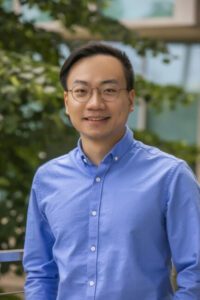Interviews, Nanotechnology at Northwestern
Meet Guanyu Lu, Northwestern’s First Fraser Stoddart Fellow
August 09, 2023

Guanyu Lu is a member of the Swearer Lab, a group working on advancing chemical knowledge and technology to support a major shift toward sustainability needed to combat climate change. Guanyu is the first recipient of the Fraser Stoddar Fellowship.
“I am thrilled to be at Northwestern, where I can collaborate with some of the brightest minds in interdisciplinary studies. Together, we can learn from each other and push the boundaries of nanoscience to create meaningful impact in the world.” -Guanyu Lu.
Where are you originally from?
I was born in Chongqing, a city in China known for its steep hills, spicy cuisine, and particularly its bold, flavorful hotpot.
Where did you complete your undergraduate degree?
I completed my bachelor’s in Energy and Power Engineering at Xi’an Jiaotong University in China.
How does it feel to be the first Fraser Stoddart Fellow?
Being named the first Fraser Stoddart Fellow at Northwestern is an incredible honor and a humbling experience. Sir Fraser Stoddart, a 2016 Nobel Laureate in Chemistry, has made a tremendous impact in nanoscience research and education at Northwestern. As such, this fellowship carries a profound legacy to which I hope to contribute. This fellowship provides a tremendous opportunity to work as an independent postdoctoral researcher under the mentorship of world-class nanoscience and nanotechnology researchers at the IIN. I am excited about the challenges and breakthroughs to come, and I hope to embody the innovative spirit that Sir Fraser Stoddart represents in my own work.
When did you first become interested in nanotechnology?
My interest in nanotechnology began during my undergraduate research journey in Prof. Gui-hua Tang’s lab at Xi’an Jiaotong University. There, I studied superhydrophobic surfaces with silica nanoparticles, focusing on delaying frost and ice formation. This experience revealed to me how nanoscale structures can significantly impact scales much larger than themselves, which sparked my fascination with nanoscience and nanotechnology.
After my undergraduate, I moved to the US to pursue my PhD at Vanderbilt University under Prof. Joshua Caldwell, where I studied nanophotonic materials and devices, especially in the infrared spectrum region.
How do you explain what you study to non-scientists?
In my PhD research, I studied the interactions between light and matter at an extremely tiny scale, specifically through a type of ‘hybrid’ particle called a polariton. These polaritons are interesting because they are partly light and partly matter. What’s fascinating is that they can shrink long-wavelength infrared light into nanoscale dimensions. Imagine squeezing a mile-long rope into a small box without losing any of its properties—that’s kind of what I was doing but with light! This allowed me to develop a new type of infrared light source and enhance heat transfer in extremely small structures.
Now, in my postdoc research at Northwestern, I’m studying how these hybrid particles, the polaritons, can affect chemical reactions.
What inspired you to focus on that, and what do you hope to achieve?
My motivation for my PhD work was twofold. Firstly, there is a need for a new generation of narrowband infrared light sources. Current technologies, with their low efficacy and bulky, expensive devices, are unsuitable for many applications. I hoped to innovate in this area by transforming transitional thermal emissions into LED-like responses using the hybrid particles I’ve previously mentioned.
Secondly, I wanted to address the classic size effects in heat dissipation that occur when electronics, such as the transistors used in chips, are miniaturized. The hybrid particles, which combine light and matter, could offer additional channels to dissipate heat, thereby enhancing heat transfer in nanostructures.
As for the postdoc work that I recently began, it’s aligned with current energy strategies, particularly the drive toward discovering novel approaches for sustainability applications. I hope to contribute to our understanding of the interaction between polaritons, these hybrid optical states, and chemical reactions. This could help tackle some of the grand challenges we face in sustainable energy.
What has been a highlight of your time at Northwestern? How has the adjustment been?
I’ve been at Northwestern for a month and a half now, and I’ve thoroughly enjoyed exploring new places, meeting new people, and transitioning into my postdoc work. One particular highlight has been getting to know my new colleagues and learning from each other. The adjustment has been great so far. The weather has been delightful and has definitely contributed to my positive start at Northwestern.
What has been the most challenging aspect of your work?
The most challenging aspect of my work is navigating the complexities of interdisciplinary research. These areas are often uncharted territory, as they bring together distinct fields in new ways. Take, for instance, my study of polariton-mediated nanoscale heat conduction. This research combines the fields of photonics and heat transfer and is still in the early stages. As such, there are many unknowns, but with these come many opportunities for exploration.
Can you tell me about your experiences either being mentored or mentoring others?
I’ve been fortunate to have fantastic mentors throughout my academic journey, and I greatly appreciate their guidance and support. My PhD advisor, for instance, was always open to exploring new ideas and fostering new collaborations, which enriched my research experience significantly. I’ve also found great joy in mentoring and working with younger scholars. Seeing an undergraduate or first-year graduate student, I’ve mentored present at a national conference or co-author a paper in a high-impact journal is incredibly rewarding.
What are your hobbies outside of the lab?
Outside the lab, I enjoy traveling to new places and trying different foods. I am also a soccer and movie fan and enjoy watching intense soccer games and good movies.
Stay current on Guanyu’s NU experience and work by following him on Twitter @Guanyu__Lu.